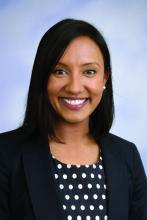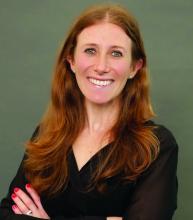Subspecialty training in advanced endoscopy has become increasingly appealing to GI fellows. The allure of an ever-evolving and innovative field is demonstrated by a substantial increase in the number of training programs over the last 2 decades, from 10 in the year 2000 to over 100 currently.1 Despite its increasing popularity, women interventionalists have been a glaring absence in this phenomenon.
For the 2018-2019 academic year, women represented only 12% of incoming advanced endoscopy fellows who matched through the American Society for Gastrointestinal Endoscopy (ASGE) match program. Perhaps more concerning, studies have found that the percentage of female trainees interested in advanced endoscopy diminishes as general GI fellowship progresses.2
Several potential contributors have been cited that elucidate this disparity including work-life balance, radiation exposure, and lack of mentorship.2 Implicit bias also undoubtedly plays a role.
Choosing a career path: Academia vs. private practice
The decision to pursue academia versus private practice in the field of advanced endoscopy is not always straightforward. For a relatively saturated subspecialty, geographic constraints and availability of positions may limit one path or another. Although an interventional practice is best supported by a tertiary care center, there is a known opportunity conflict between the number of advanced endoscopy trainees and the availability of academic positions.3
Although private practice may offer more autonomy in scheduling and fewer nonclinical responsibilities, there may be increased pressure to retain high clinical volumes with direct financial consequences, as well as limitations in overall career advancement. Pursuing an academic path, however, may lead to less flexibility in scheduling, more travel involved with speaking engagements, and teaching and/or research responsibilities disrupting a favorable work-life balance.3 Regardless of career path, the best environment to thrive as an advanced endoscopist and a mother is one in which there is recognition and support of the challenging early family years.
Family planning
Given the long and arduous training, along with the pressures of the early faculty/clinical years, there is no perfect time for a pregnancy. Even when a pregnancy is planned, there is no certainty it will follow the intended course. The challenges specific to a career in advanced endoscopy are not well described.
Considerations during a pregnancy
When to divulge
For female interventionalists, determining when to divulge a pregnancy and the duration of maternity leave can be elusive. There is a fine balance between revealing prematurely given the risk of miscarriage and waiting so long that appropriate precautions are forsaken. One might consider disclosing the pregnancy to a few key personnel in the endoscopy unit and/or a radiation safety officer to optimize early measures to prevent occupational hazards.




